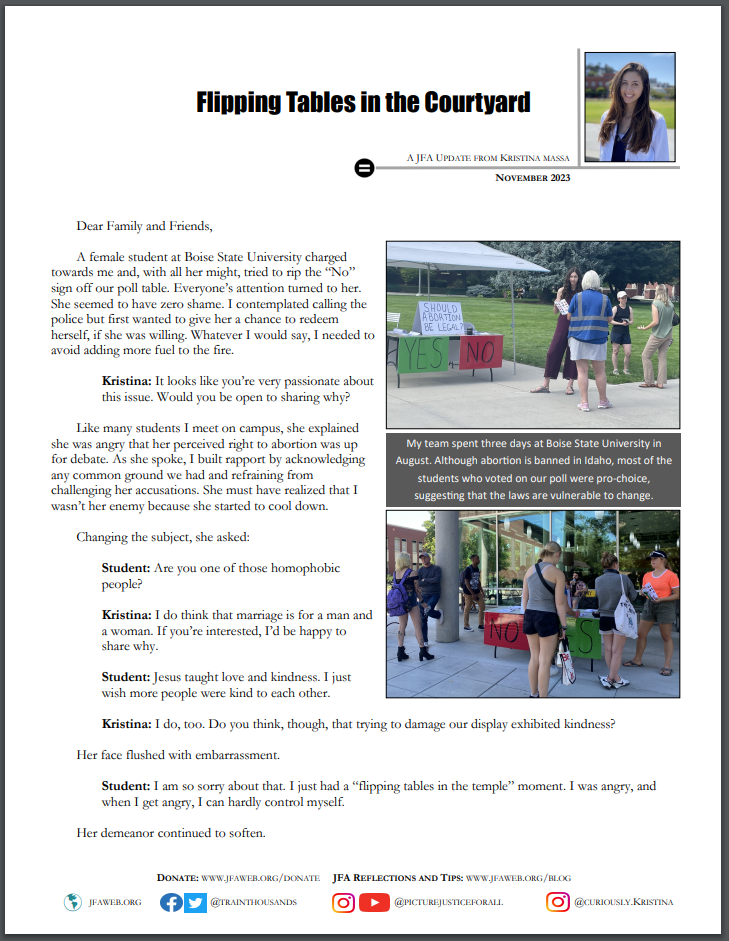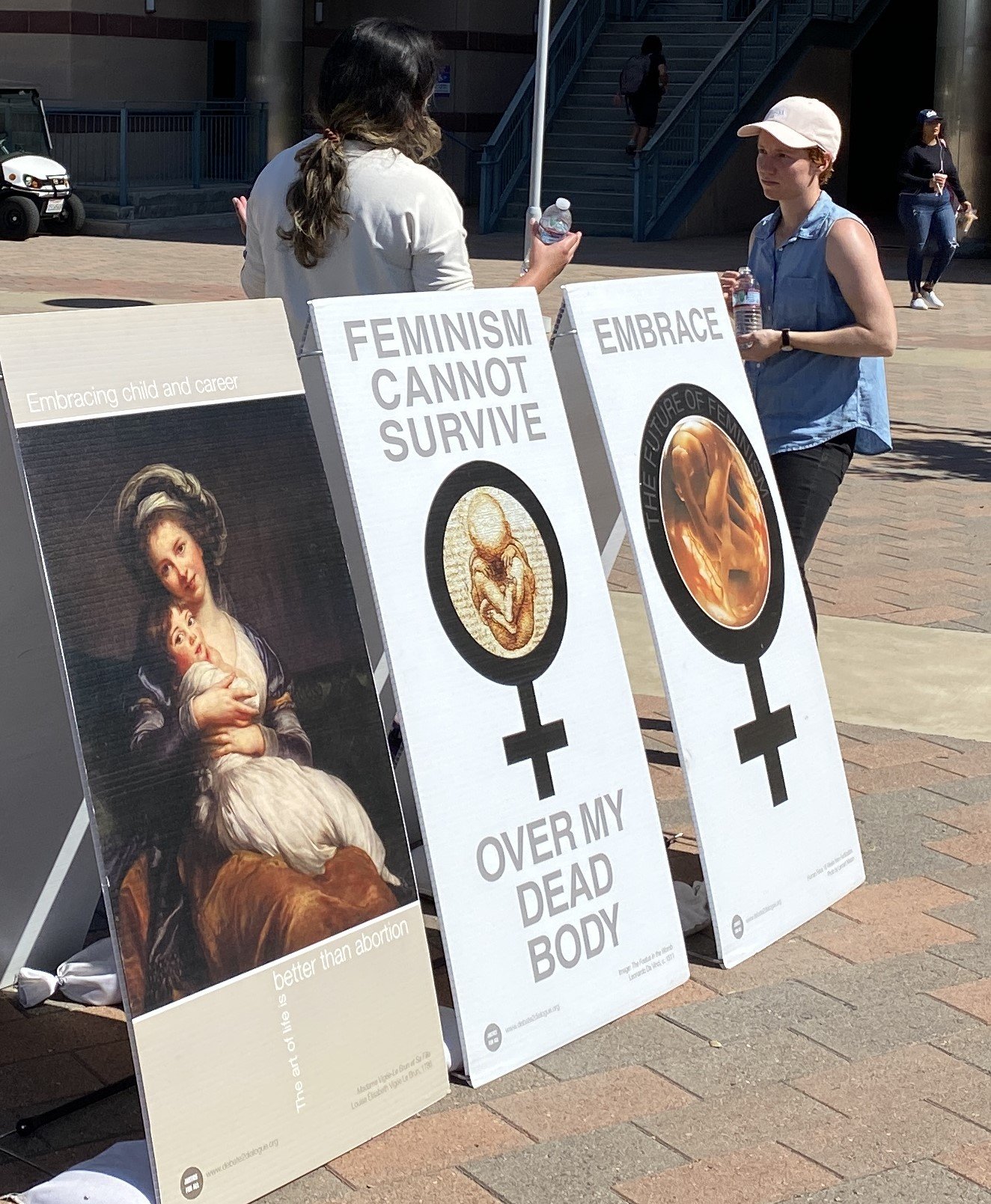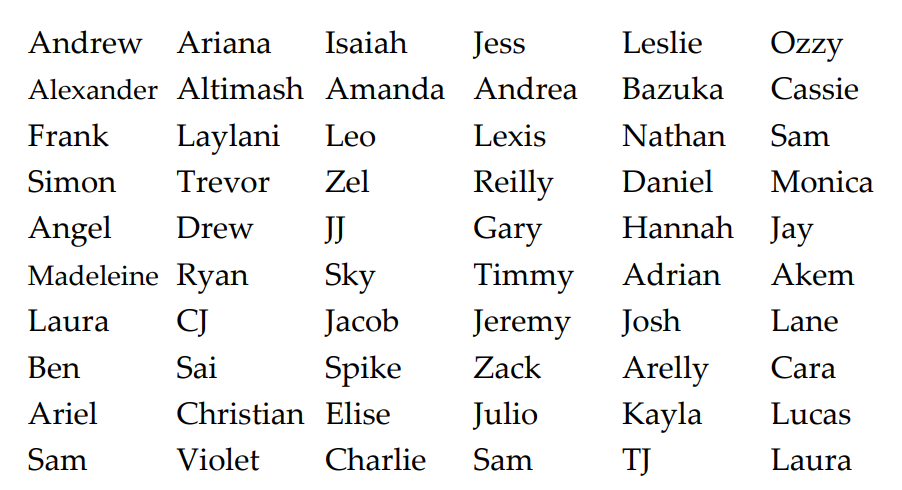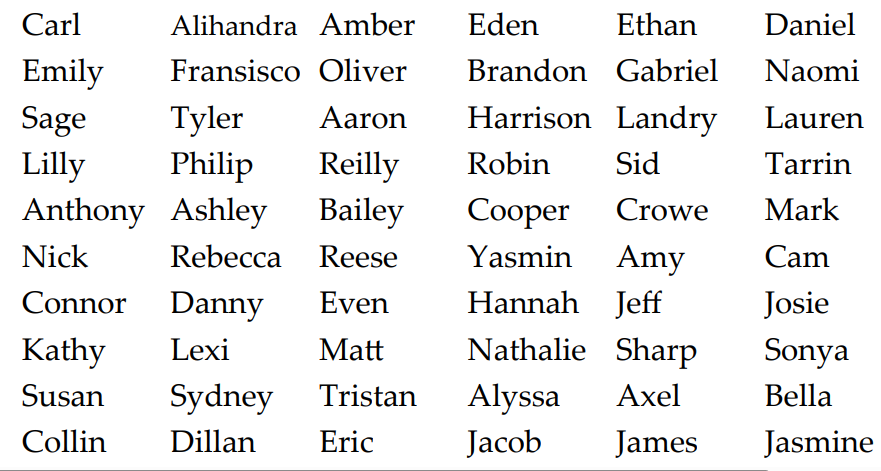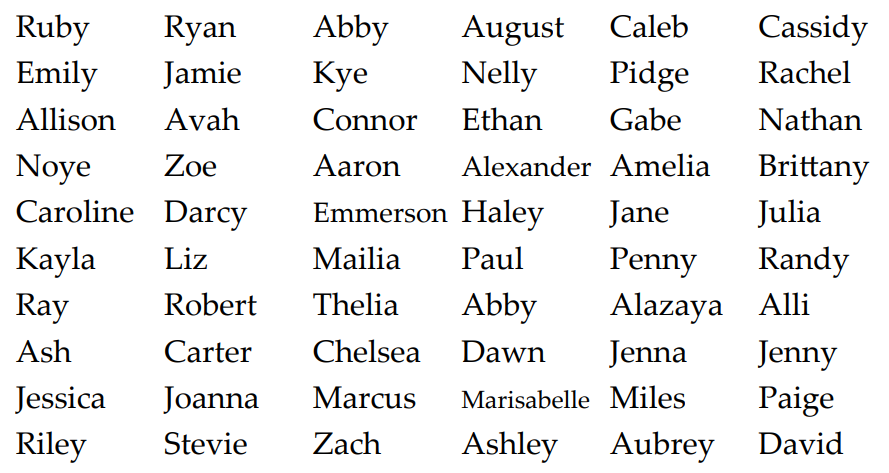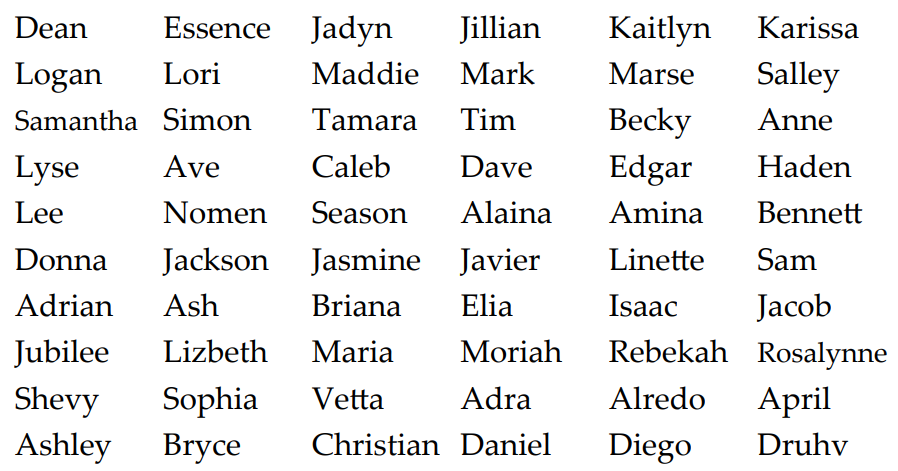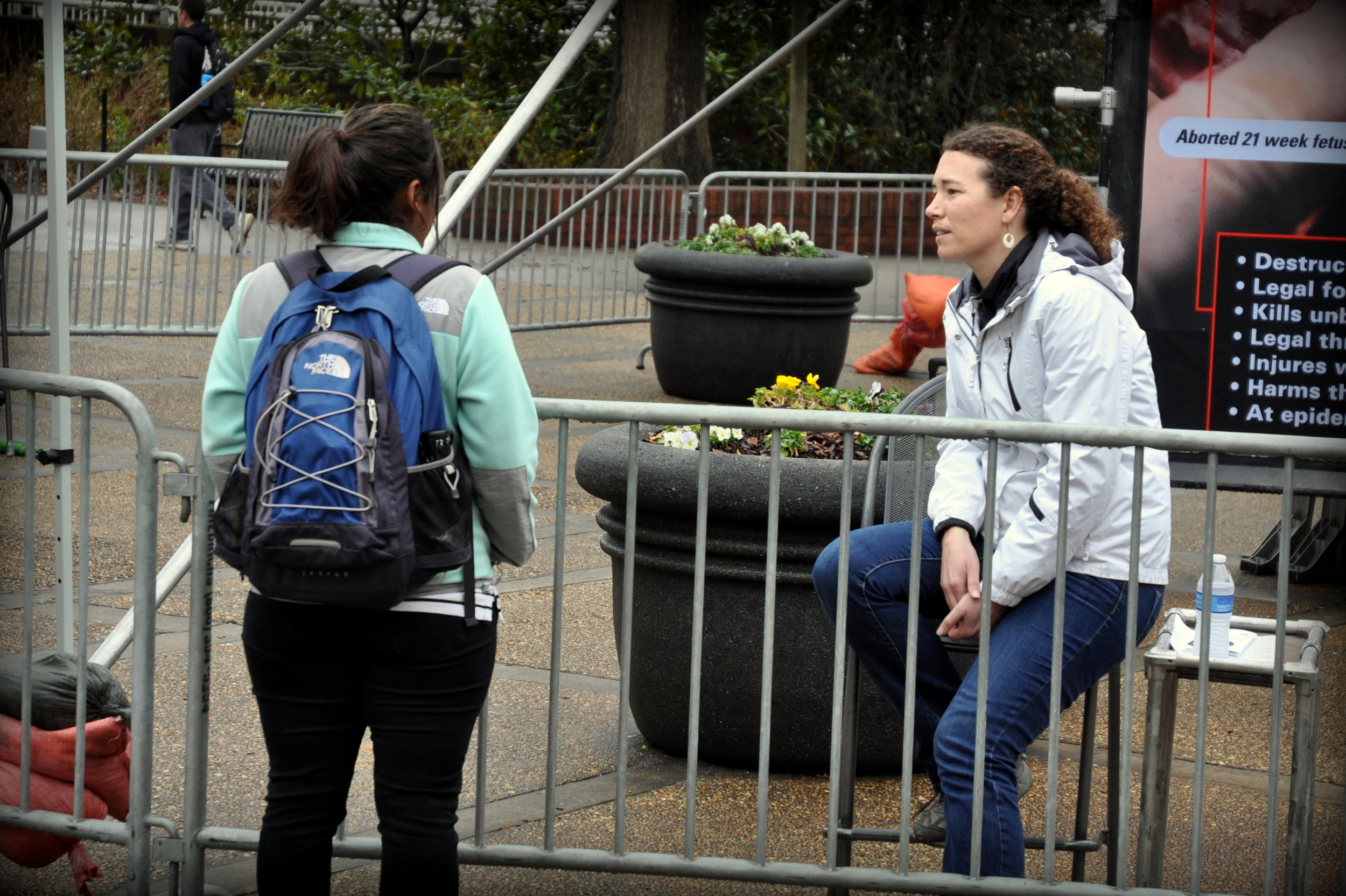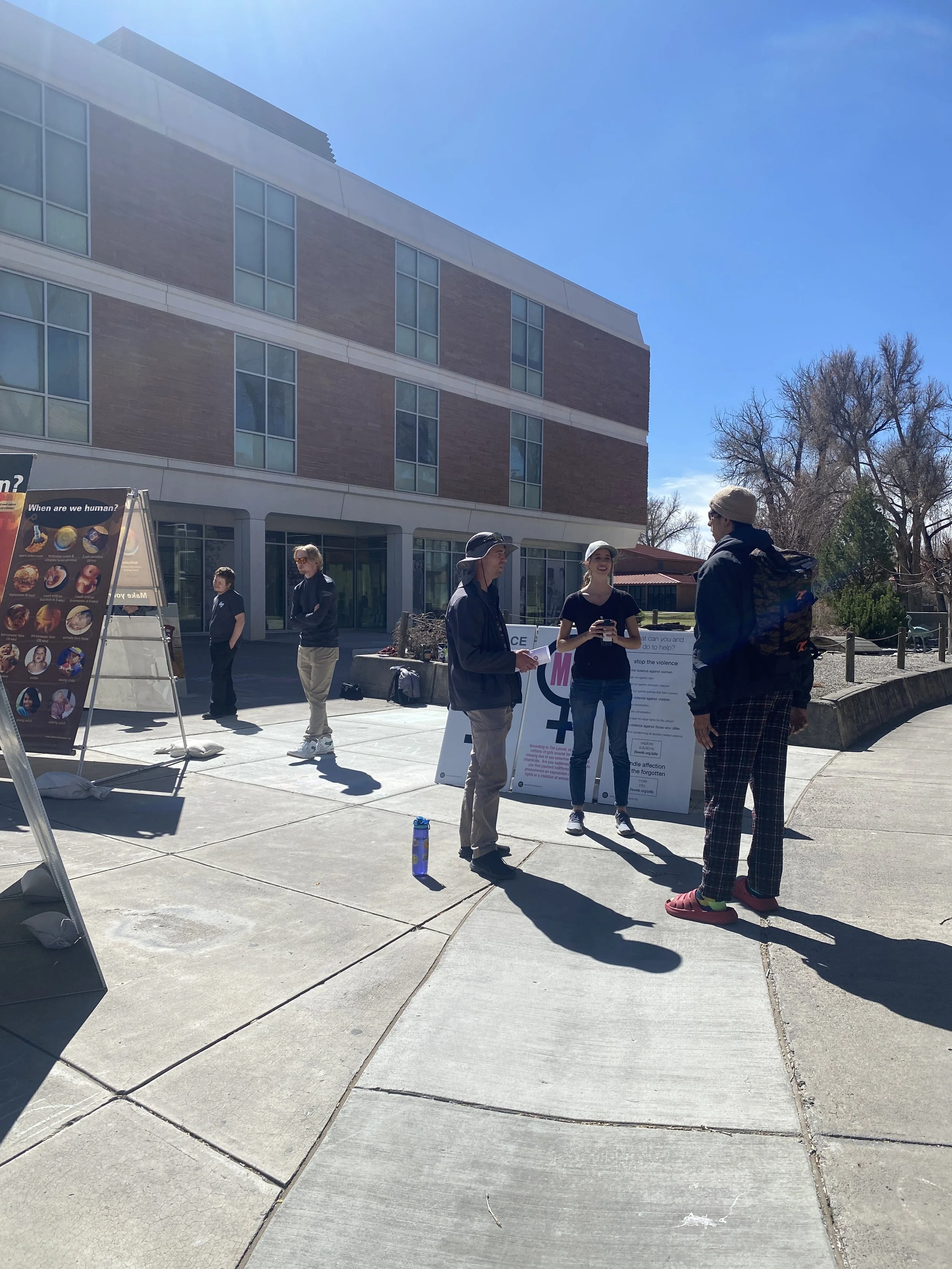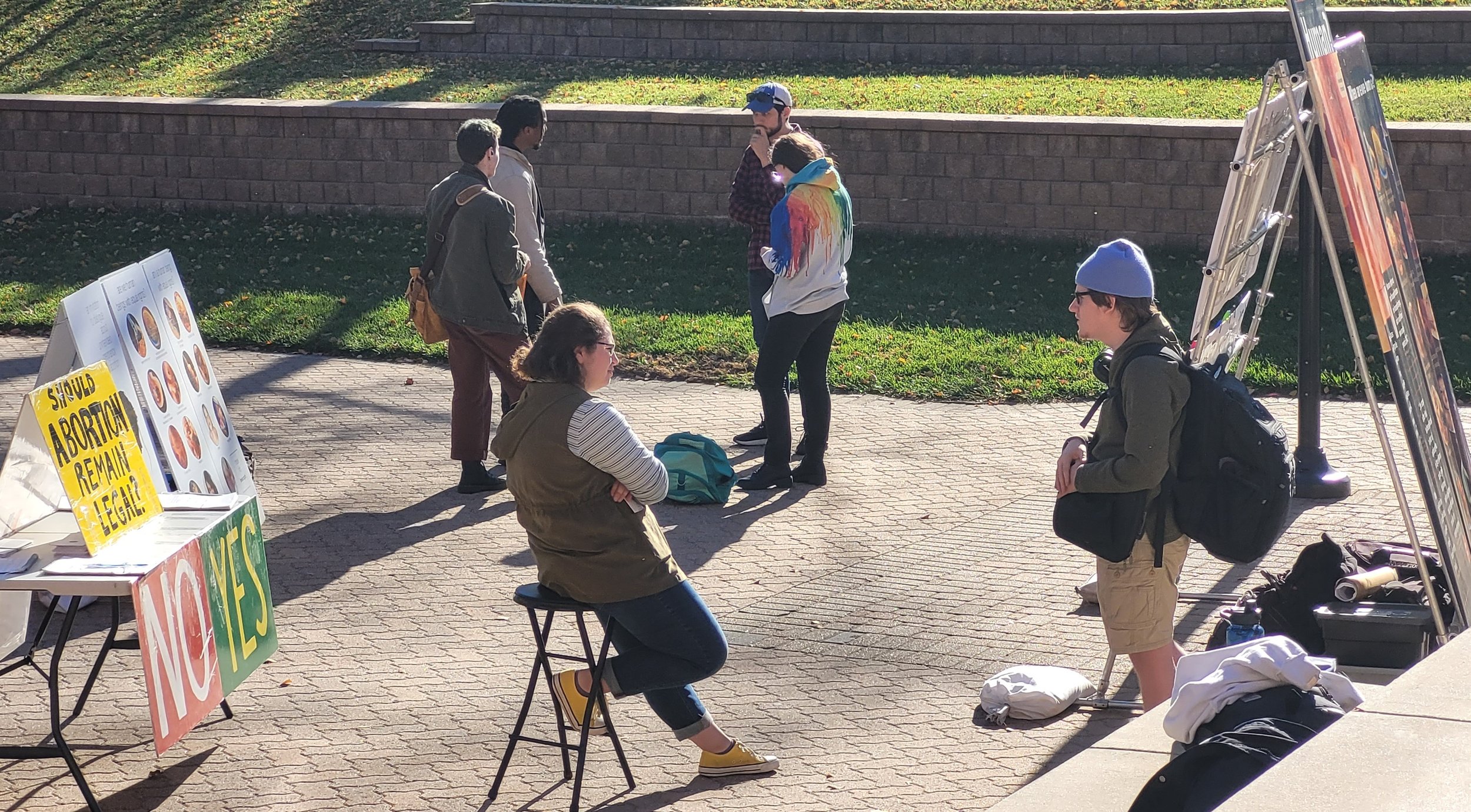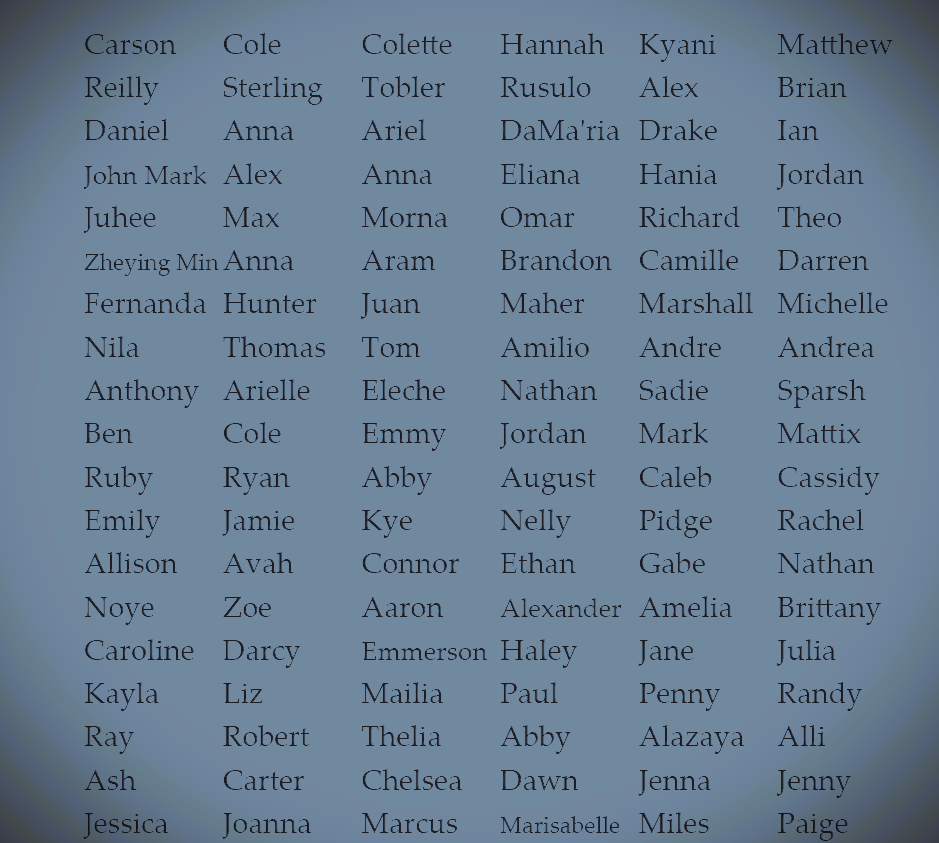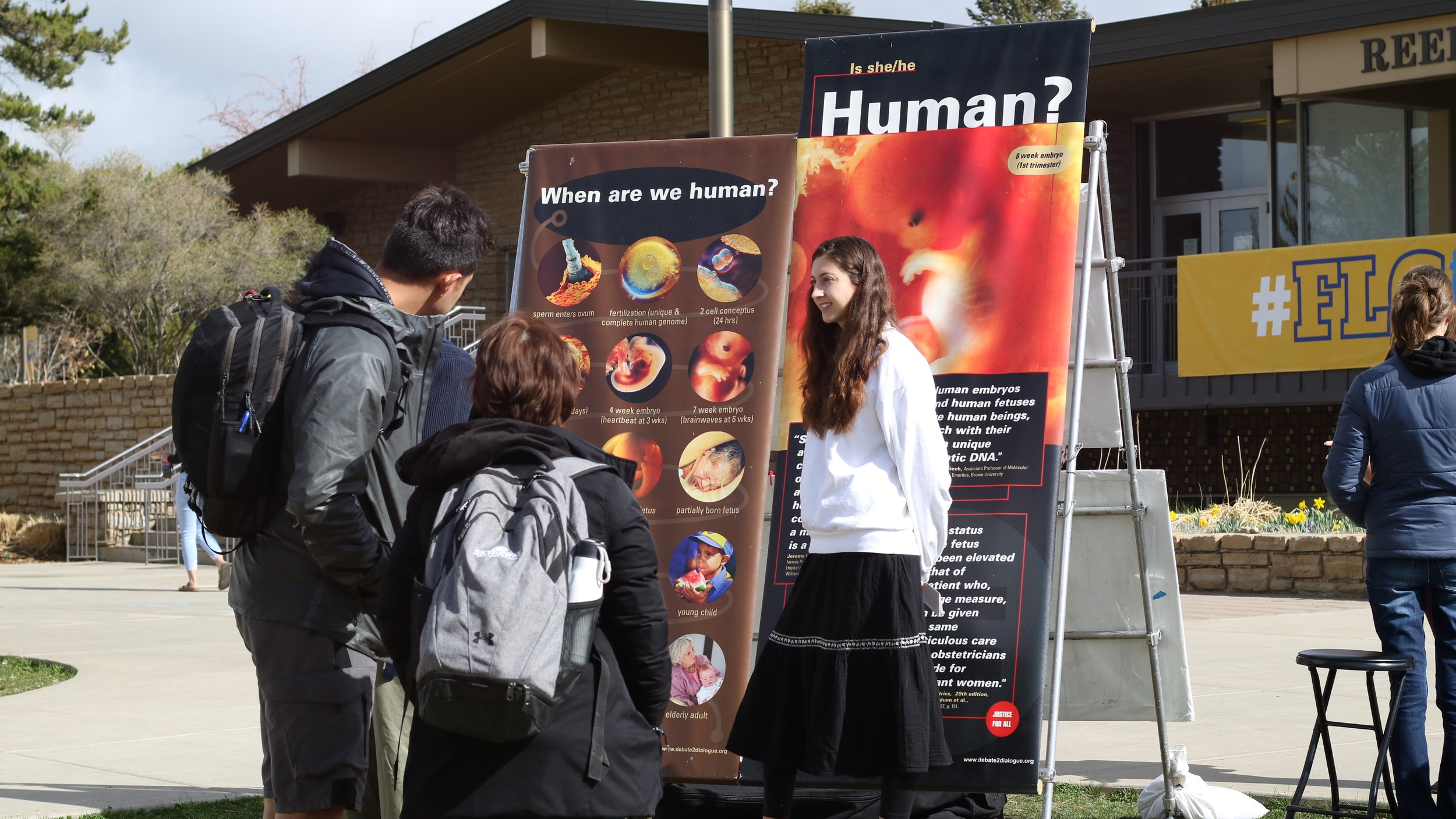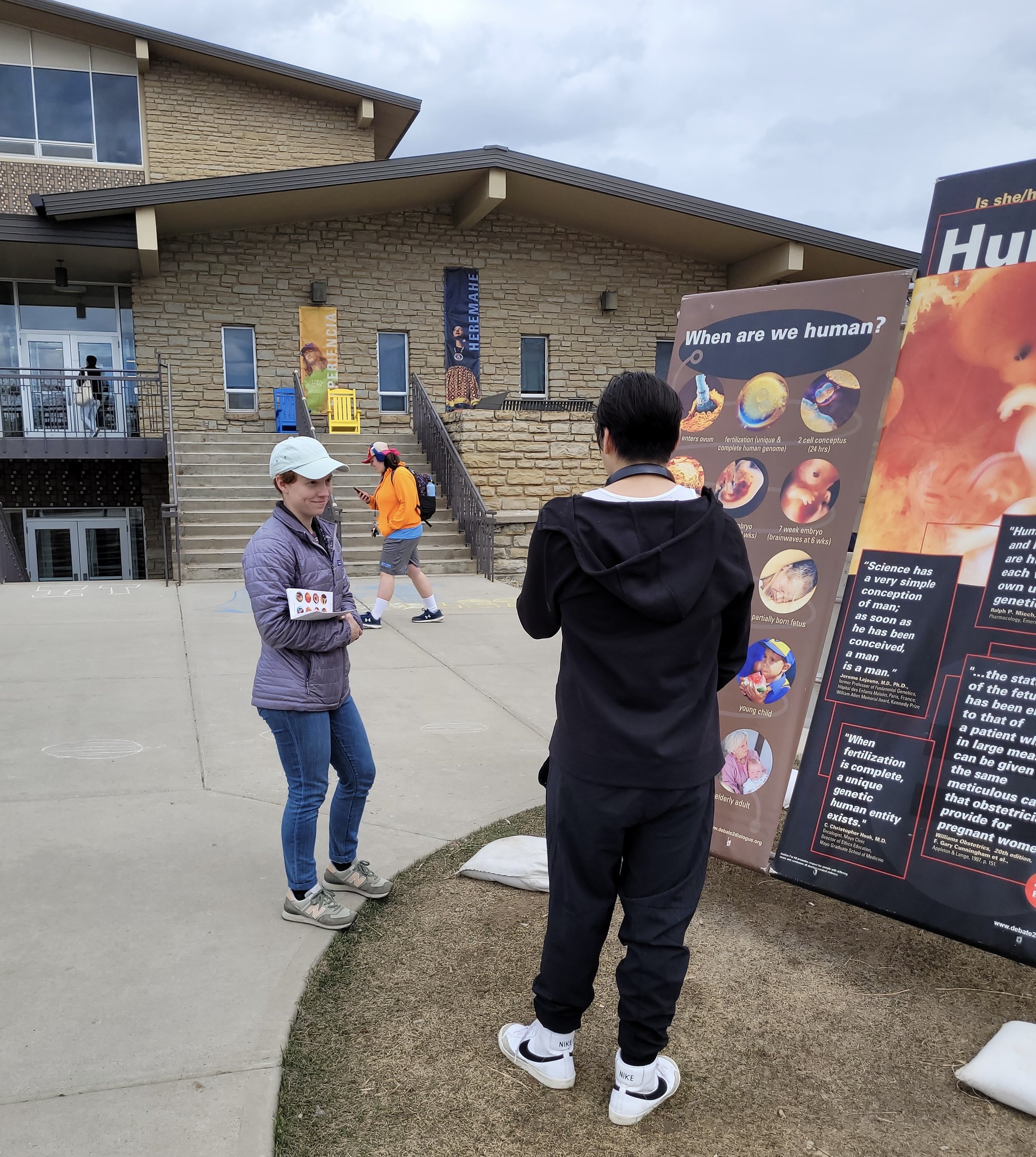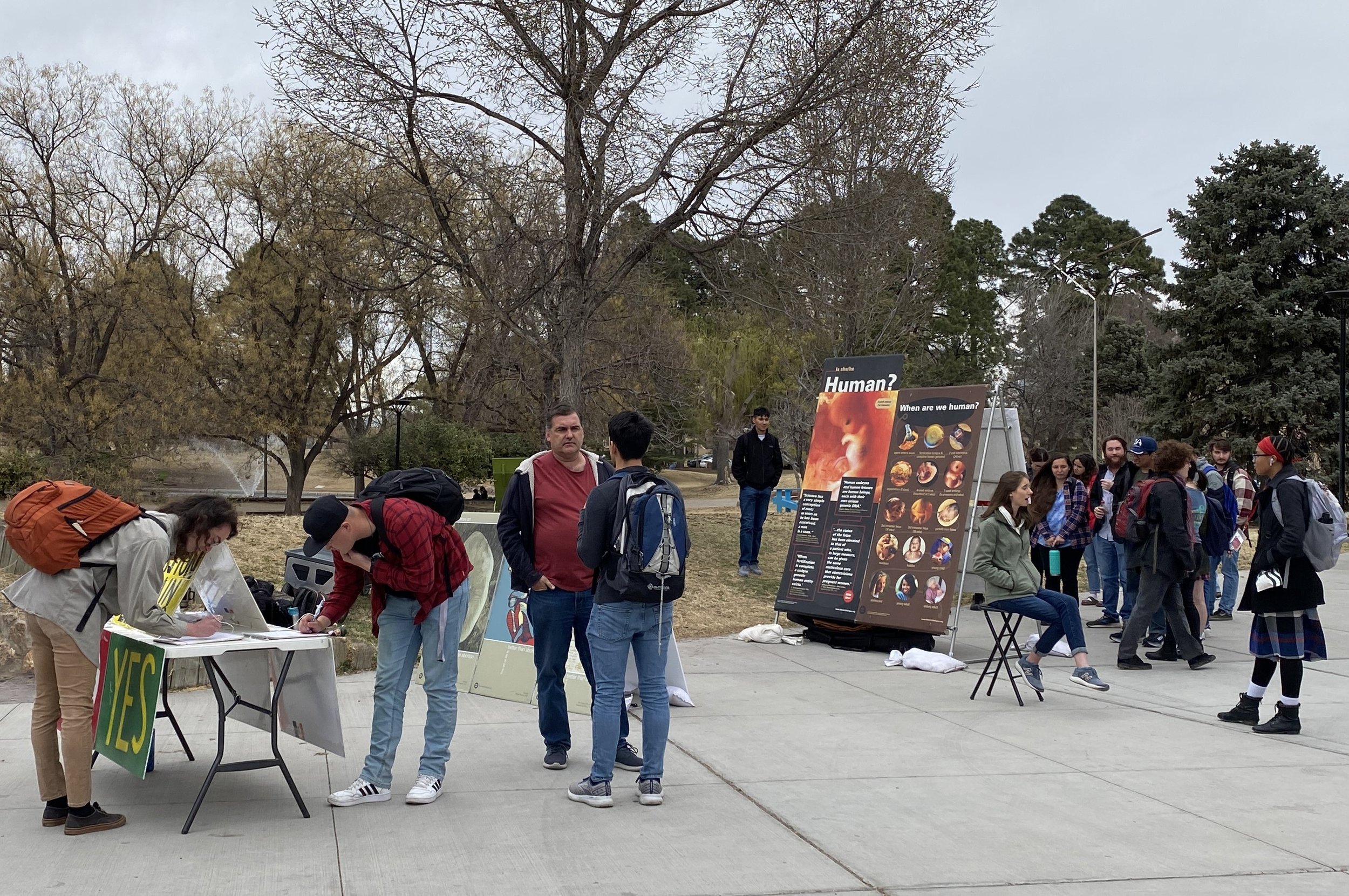Flipping Tables in the Courtyard
My team spent three days at Boise State University in August. Although abortion is banned in Idaho, most of the students who voted on our poll were pro-choice, suggesting that the laws are vulnerable to change.
A female student at Boise State University charged towards me and, with all her might, tried to rip the “No” sign off our poll table. Everyone’s attention turned to her. She seemed to have zero shame. I contemplated calling the police but first wanted to give her a chance to redeem herself, if she was willing. Whatever I would say, I needed to avoid adding more fuel to the fire.
Kristina: It looks like you’re very passionate about this issue. Would you be open to sharing why?
Like many students I meet on campus, she was angry that her perceived right to abortion was up for debate. As she spoke, I built rapport by acknowledging any common ground we had and refraining from challenging her accusations. She must have realized that I wasn’t her enemy because she started to cool down.
Changing the subject, she asked:
Student: Are you one of those homophobic people?
Kristina: I do think that marriage is for a man and a woman. If you’re interested, I’d be happy to share why.
Student: Jesus taught love and kindness. I just wish more people were kind to each other.
Kristina: I do, too. Do you think, though, that trying to damage our display exhibited kindness?
Her face flushed with embarrassment.
Student: I am so sorry about that. I just had a “flipping tables in the temple” moment. I was angry, and when I get angry, I can hardly control myself.
Her demeanor continued to soften.
As I asked more questions about her life, I learned that she was raised in the Episcopalian church, her parents were divorced, and her dad had a boyfriend.
Student: Jesus preached against judging people, and he actually thought highly of women. He was even kind to prostitutes.
Kristina: He did treat women well, which was countercultural at the time. In the story of the woman caught in adultery, he challenged the Pharisees who were accusing her by saying, “Let the man without sin cast the first stone.” But do you know what he did afterwards?
Student: No, what did he do?
Kristina: He said to the adulterous woman, “Go, and sin no more.” He taught repentance. So Jesus’ full message is faith in him accompanied by love and repentance. We have to turn from our sin.
Student: What does “sin” mean?
She seemed to know so much, yet so little at the same time, but she was enthusiastic to learn.
I walked her through the story of the fall in the Garden of Eden, how each of us has disobeyed God by violating the moral law, and how Jesus is the only way to freedom from sin. I also shared why marriage is a covenant that can only exist between a man and a woman. While she didn’t agree with my explanation, she didn’t argue with it either.
Kristina: Would it be alright if I prayed with you right now?
Student: Sure!
We bowed our heads. I thanked God for our conversation and the unique gifts that He gave her. I also asked that her heart would be opened to knowing Jesus and to turning from the sin in her life. Then it was time for her next class.
Student: I learned a lot today, and I really appreciated this conversation. Again, I am so sorry for trying to damage your display.
It was like the woman I met earlier that morning was a new person! We said our goodbyes and parted ways.
Thank you for your prayers and support as I continue in this mission. It’s through experiences like these that I know the Holy Spirit is with my team and moving in the people with whom we speak. God generously gives second chances, and witnessing the character growth of this student was a humbling reminder of the countless redemptive opportunities He continues to offer me (and every one of us!).
"Hey You! You're a Gender Traitor!"
In a conversation at Cal State San Marcos in October
I was in the middle of a conversation at Texas State University awhile ago, and a woman singled me out and yelled, “Hey you! You’re a gender traitor!” She proceeded to swear at me as she walked by. While this wasn’t a pleasant experience, when it came to mind recently I thought of Proverbs 20:5 which says, “The purpose in a man’s heart is like deep water, but a man of understanding will draw it out.”
Sometimes our lives intersect with other people at times when they are deeply suffering and struggling. When we bring up difficult topics they may react in very negative ways. I’m not saying that’s what was going on with this woman. I didn’t get to talk to her, so I don’t know. There are some people who just want to deride and attack those with whom they disagree, and it’s not a great use of our time to try to engage them. But that is not the norm. I think we should give people the benefit of the doubt in these situations. We all have bad moments, and being on the receiving end of someone else’s bad moment gives us an opportunity to extend God’s grace to them.
I was at the University of Northern Colorado in September, and I asked a woman who was signing our poll if she wanted to share her thoughts about abortion. She put the pen down, looked at me, and in some colorful language basically said she didn’t care what other people thought so she would be happy to talk. I remember hoping the interaction would end quickly because I assumed it wasn’t going to go well. But I was wrong. It ended up being my best conversation that week, and I got to tell her about Jesus!
Proverbs 19:11 tells us that it is our “glory to overlook an offense.” I have found that if I don’t react to mean or dismissive comments, and I genuinely try to understand the people in front of me, I have a better chance to get to know them, their story, and why they believe what they do. Oftentimes this gives me the opportunity to challenge their false beliefs more effectively and point them to the truth.
Give people second chances. Third chances. Even fourth chances. Don’t give up on them too quickly. What is going on inside of people is like that deep well we read about in Proverbs 20:5. We are not going to get to the bottom quickly. Many people are angry, hurt, confused, and lost. That may make for some rough beginnings to our conversations, but that’s okay.
I am entering my fifth year with Justice For All, and I’m so thankful for your financial support and prayers that make my work possible. In Mere Christianity, C.S. Lewis says, “If there were no help from Christ, there would be no help from other human beings.” God works through you and me to help the people He puts in my path, whether I’m talking to students on campus, sidewalk counseling at the abortion clinic, teaching at our workshops, or meeting with local ministry leaders to plan events. I’m grateful for all of the opportunities I have to help others as they wrestle with questions surrounding why human beings, born and unborn, should be protected and loved. Thank you for investing in me. I couldn’t do this without you.
Is Abortion just a Choice?
After our team finished setting up at Colorado State University for the day, I walked over to our poll table which asked the question, “Should Abortion Remain Legal?”
A young man I’ll call “David” walked over and signed the yes side. After I greeted him, I began to ask him about his beliefs. He believed the unborn is human, and he did not like abortion. Nevertheless, he felt that abortion should be legal because he did not want the government controlling what we can and cannot do. Our conversation went something like this:
Outreach at Palomar College in California October 2023
Andrea: I agree with you that choice is important. Obviously, we live in America where we have many freedoms. It is important to be able to make choices as long as these choices do not harm other human beings.
David: Yeah, I get that.
Andrea: We probably agree that murder, rape, and child abuse is wrong and should not be legal, right?
David: Yes.
Andrea: We have laws in place against those actions to protect human beings from harm. For example, it is illegal for someone to come to this campus and start shooting because that “choice” would harm other human beings. It is the same with the abortion issue. Since the unborn is a living human being, abortion is a choice that takes the life of an innocent human being.
David: Wow! I have never thought about it that way. That makes sense.
Andrea: Another way to think about it is to imagine that we have two buckets. One bucket is full of choices like your favorite ice cream flavor, what degree you want to get, your favorite sport, and so forth. These would be personal preferences. I think we agree that we should have the freedom to make those choices. The other bucket is full of choices that harm another human being, like murder, rape, and child abuse. Which bucket would you say abortion belongs in? (Read more about how my colleague Tammy Cook came up with this two-bucket analogy at www.jfaweb.org/two-buckets)
David: Oh…I would have to say that abortion belongs in the bucket of choices that harm another human being!
I often talk to people like David who believe the unborn is a living human being and believe abortion is wrong, but also think it should be legal because they feel it is merely a personal preference. It is helpful to point out why abortion should be illegal. Since the unborn is a living human being, elective abortion kills an innocent child. Therefore, elective abortion should not be legal.
As we enter the Thanksgiving and Christmas season, I want to thank you for all your prayers and support. As I reflect back on all God has done this year, I am in awe. It has been incredible to see Him at work. It is people like you who make it possible for me to have these conversations and to help JFA behind the scenes as we work to train many Christians to do the same! If you are not part of my support team, please prayerfully consider joining by giving an end-of-year gift or a monthly pledge.
Welcome ETS and EPS Members!
In his paper today at the Evangelical Theological Society (ETS) National Conference, Spencer Stewart discussed JFA’s model of creating a bridge from Seat Work to Feet Work as a model of pro-life education. If you are a member of ETS or the Evangelical Philosophical Society (EPS), welcome. Here are links to JFA’s resources which may interest you:
One Person Can Change the World
Train One to Reach One, then Pray for Each One
In my October letter, I asked readers to make a monthly pledge, recommend JFA to a friend, and commit to pray for JFA. Read or share this important letter.
In this Impact Report, we share names and pictures of some of the people with whom our team interacted in 2023. Would you post this list somewhere in your home and pray that God will help each of these people to love the unborn, hate elective abortion, and accept God’s love?
To view more pictures and read recent stories of conversations, see our blog.
As you consider your year-end giving, would you make a special gift to JFA to help our team train many more Christians to reach the people God puts in their path? Thank you!
Pray with us for…
Because One Person Can Change the World
There are four senses in which “one person can change the world.” Ultimately, we believe Jesus Christ is the one Person who changes the world for the better. This is why we exist and why we train Christians to depend on Christ to make change. In addition, each person trained, each life saved, and each person listed below also represents one person who can change the world, by God’s power. Each person is worthy of respect and protection and investment, even if he or she may never change the world in a positive way. It is true, though, that each person JFA reaches could play a pivotal role in changing the world for the better. We thank God that we can partner with you in training Christians to reach one person at a time.
Will You Partner with Us through a Monthly Pledge?
October 2023 Letter from the Executive Director
Students at the University of Northern Colorado (UNC) recently invited Justice For All (JFA) to help them reach their campus. Madelyn Biggers, the president of the club, reflected on the event:
“Partnering with JFA was a great experience for the UNC Students for Life… The seminar was very informative and the best pro-life training I’ve ever attended… The instructors were knowledgeable and compassionate. Tabling on campus was a great learning experience, and we definitely got a lot of people talking about abortion. I would love to host JFA again in the future!”
Madelyn’s experience is just one example of how God is using the JFA team to train Christians, nurture leaders, and get people thinking clearly about abortion. Our paid internship program is another (see our fall interns, Seth and Catherine, below).
To train more people, the JFA team has been at work in nine states this fall, including three universities new to JFA*. See recent stories of changed minds and hearts below, and see pictures from recent events at www.instagram.com/picturejusticeforall.
Interns Catherine Gimino (left) and Seth Wiesner (left of center) interact with UNC students.
To continue to invest in leaders like Madelyn, Seth, and Catherine, we need your help. Each of our trainers raises personal support, and their travel, food, laptop, and other essentials are covered by our other giving designations. Each of our trainers and programs needs prayer and increased support, so now is a great time to partner with us. (Learn more about our current needs at www.jfaweb.org/invest.)
Will you make a monthly pledge of financial support or commit to increasing your support? (Set up a recurring bank transaction or credit card transaction at our Donate page. Or, call the number below.)
If you are already giving at the level you can, thank you. You are so important to our team! Would you pass this letter on to one friend with your recommendation that JFA is worthy of support?
Are you unable to give at this time? Please commit to pray for a team member or the entire team.
Use the enclosed form or go to the JFA Donate page to make a commitment to pray or give. Or, you can call our office (316.683.6426) so that our wonderful office manager, Eva Heath, can assist you.
Recent Stories of Changed Hearts and Minds
Click here to see recent outreach events at Instagram
Recent and Upcoming Outreach Events
Note: Interactive workshops preceded all events listed below.
8/28-30 * Boise State University (ID)
9/18-20 University of Northern Colorado (CO)
10/2-3 * Minnesota State Univ. Mankato (MN)
10/9-11 CSU San Marcos & Palomar College (CA)
10/18 * Christopher Newport University (VA)
10/30 University of Central Oklahoma (OK)
10/31-11/1 University of North Texas (TX)
11/13-15 University of Texas at Austin (TX)
Secular Pro-Life Resources
It’s common for pro-life and pro-choice advocates alike to assume the pro-life position is inherently religious.
For pro-life advocates, we encourage them to consider beginning conversations with secular arguments in order to not put unnecessary stumbling blocks in someone’s way. We also ask pro-life advocates to consider that even if they hold religious reasons for their position, they can also hold non-religious, publicly-accessible reasons for their position that can persuade the masses in a pluralistic society such as ours in 21st century US. See, for example, Rebecca Hotovy’s “#Mindblown” conversation with Brian. Brian began with the belief that he could not support a law against abortion because his reason for his pro-life view was religious. He believed it was wrong to put his religious view into law. Rebecca Hotovy deftly showed him that he also held his position for a reason that didn’t rely on explicitly religious support: it’s wrong and should be illegal to harm someone else.
For pro-choice advocates, we encourage them to consider the fact that there are many pro-life advocates who are agnostics or atheists. The gutsy new presidential candidate Terrisa Bukovinac is one high-profile example. The apologists at Secular Pro-Life are examples as well. Many of the folks at Libertarians for Life are also non-religious.
For pro-life and pro-choice advocates alike, we recommend the following resources from these atheistic and agnostic pro-life advocates. While we don’t agree with the atheism or agnosticism of the authors of these resources, they nonetheless contain many good arguments and truth claims, and they can help religious pro-life advocates frame their arguments in ways that are more persuasive to the average non-religious person. This is right in line with our emphasis on finding common ground when possible.
“Later Abortion”: Very helpful microsite filled with links and research curated by Secular Pro-Life to show that “There is no quantifiable data to support the idea that all or even most later abortions are medically necessary.” It includes a collection of data on the reasons women opt for later abortion. This helps us respond to claims that “no late-term abortion is elective.”
“Embryonic Hearts”: This microsite demonstrates that the unborn has a primitive heartbeat from very early in development and describes the development of the heart from scientific textbooks.
Resources from Secular Pro-Life Related to the Question of Rape
“I’m an Emergency Physician. Pro-Life Laws Don’t Threaten My Patients.” One doctor’s perspective on abortion restrictions in Texas since Dobbs.
Guardian article “What a pregnancy actually looks like” erases embryos
Responding to 16 pro-choice claims about Dobbs, the pro-life movement, and abortion bans
Why artificial wombs pose a challenge to pro-choice personhood arguments
The pro-choice view survives on widespread ignorance of biology
The Pain that Lies Beneath
In one sense, conversations about abortion are really simple. Abortion kills an innocent human being, and that shouldn’t be legal.
Psychologically and emotionally though, this issue is incredibly complicated. People’s stories and their experiences influence how they view and understand simple ideas. When deep pain and trauma are influencing their views, those simple ideas can become complicated.
I talked to “Emily” at Fullerton College in January. My colleague Jon Wagner shared with me afterward that she had signed our free speech board and had written something about abortion being an issue of women’s bodily rights. He said she was visibly agitated and shaking.
From the free speech board, she went to our poll table where I asked her if she wanted to share her thoughts. She quickly told me that our display was disturbing to her. She didn’t like it and said the pictures of embryology were “harmful.” She told me our outreach on campus was “part of the problem” and didn’t do justice to what is going on with this issue. While I did not agree that our display was “harmful,” the things she shared throughout our conversation helped me begin to understand why she felt the way she did.
When I started asking her questions, she told me that she had a friend who was raped and became pregnant. Her friend decided to keep the baby, but she committed suicide shortly after giving birth. She was only thirteen. (Her baby is now five years old.)
She also shared with me that she has a friend who was addicted to meth when he was born due to the choices of the mother. She told me that this friend doesn’t like her life and that she doesn’t want to live anymore. In addition to this, Emily told me that she has a condition where if she got pregnant, she could either keep taking her medication and her baby would be severely deformed or she could stop taking her medicine, the baby would be fine, but she would die after giving birth.
At some point in our conversation, she also shared with me that she was a Christian and thought that abortion was murder in the third trimester. Earlier in pregnancy though, she said that we cannot have laws against abortion, because there are too many circumstances that the law can’t take into account.
Pain and tragedy deeply affect people. The suffering in their pasts can warp their perspectives on issues that are morally clear. Those clear issues become unclear to them when they look at them through the lens of the shattered lives of themselves or their friends. Knowing this can help us understand why good and clear arguments appear to make no headway with some people. I know it can be frustrating when we lay out a clear case for something we believe to be true and are only met with statements that seem to show the other person is “not getting it.”
In a conversation at Fullerton in January 2023.
I think taking a step back and really engaging with the pain people experience can help us be empathetic and compassionate while we speak up for the rights of unborn human beings in this country.
Towards the end of our conversation, Emily told me that while she loves the five-year-old child her friend chose to have after she was raped, she wishes she could have her friend back instead. In Emily’s mind, if her friend had chosen abortion, she would still be here. The abortion would have “saved” her life. As odd as that may sound to us, I think that kind of statement points us to something important.
Sometimes it can feel like we just need the right argument or the right response to refute wrong beliefs. I think knowing good arguments is incredibly important because they do impact people’s views and their behavior. But sometimes, arguments aren’t going to do what we want them to do with someone who is still grieving the loss of her friend. It’s a matter of triage. When someone is bleeding out, has a sprained ankle, a broken arm, and some minor cuts, we have to assess which injury is most urgent and focus on it first. All of them are important, but we can’t focus on all of them at once.
Given the length of my conversation with Emily, I did end up making the case for why abortion is not a good solution to the tragic circumstances she talked about. No matter how great our pain is, it doesn’t give us the right to kill another human being. In these kinds of conversations, I don’t always present arguments. It’s not because I don’t care about making good arguments for why unborn children should be protected legally. It’s because sometimes given the time I have, I decide that making an argument is not the best thing to do at that moment. I trust that God will bring someone else in her life later when she is more willing and ready to hear arguments that challenge her beliefs.
I think it’s a judgment call we all need to make at times. Do I make an argument and address her incorrect beliefs now? Do I just listen and empathize with her? Do I do both? I believe we can trust that God will guide us as we make these decisions in our conversations.
Even in the midst of darkness, great evil, and tragedy, life is worth living and protecting because we serve Jesus, God in human flesh, who rose out of his own tomb victorious over death and evil. Even though this is true, there are so many people who do not feel like life is worth living, and that chasm is something we have the privilege of helping close. In this valley of tears, may we be willing to enter into uncomfortable and difficult conversations with others so that we can bridge this gap together.
You’re Invited! Oct. 17 Workshop at Christopher Newport University
Event
“Creating Dialogue on Abortion to Reach Hearts and Minds - An Interactive Workshop led by Steve Wagner”
Date
October 17, 2023
Place
Time
Part I: 5:30 PM - 7:00 PM (Check in at 5:15 PM; Includes Pizza Dinner)
Part II: 7:00 PM - 8:30 PM (Check in at 6:50 PM; Includes Dessert)
Note: Each part includes different content. You may attend one or the other, or attend both for the best experience. More notes on Content below.
Cost
There is no charge for this event, but you may make a donation to defray event costs.
Content
Part I will cover the following topics (some interactively, some briefly):
Three Essential Skills: You can start a conversation and keep it productive using just three skills: listening to understand, asking questions with an open heart, and finding common ground when possible.
Are Images Helpful? Learn to use images appropriately and sensitively in order to help people face the reality of abortion. Learn to use JFA’s “Invitation to Dialogue” Brochure (digital version and paper version) to guide a conversation.
One Central Question: Focus on the question, “What is the unborn?” and defend the idea that the unborn is a living human organism biologically.
Part II will cover the following topics (some interactively, some briefly):
The Equal Rights Mystery: Many people are unsure if the unborn are persons or have equal rights to the rest of us. We train you in this session to navigate that conversation beginning with the common ground of the Equal Rights Mystery.
The Question of Rape: Learn to meet both the relational and intellectual challenges inherent in the questions: “Is abortion right or wrong in the case of rape? Should it be legal in the case of rape?”
Do Bodily Rights Mean Abortion Is Okay? When someone says a woman should have a right to do what she wants with her body, we always begin with a response that surprises many pro-life advocates. Then we also offer a sophisticated intellectual response.
Q&A including Threats to the Pregnant Mother's Life and “Personally Opposed but It Should Stay Legal”
Be Relational...then Be Intellectual
In my May letter, I shared the story of my conversation with Stacey at Palomar College. It began with her saying abortion should be legal through all nine months of pregnancy because of bodily rights, and it ended with her saying, “I’ve never thought about whether the fetus is a person before. I’ll have to think about that.” This conversation illustrates a simple approach: Be relational, then be intellectual. What began as a principle we applied to the question of rape is now a principle we apply to every question related to pregnancy and abortion. You can see another great model of the basics of this approach in last month’s Impact Report by Kristina Massa entitled, “Answering the Hard Cases.”
I want to share a bit of the history of how this concept became so central to our teaching at JFA. A good starting point is a scene seven minutes into the documentary Unborn in the USA (2007), which was filmed about 19 years ago at Focus on the Family Institute (photo below). After watching that scene, a writer from Nerve Magazine (an edgy online magazine that is not recommended reading) said,
The guy is making perfect sense…He's an articulate, intelligent, calm presence. Suddenly, a chill creeps up your spine: I hope there are people on the pro-choice side who are equally perceptive and balanced.
I was the featured speaker in that scene, and here’s essentially what I was teaching: When talking about the topic of rape, we need to show sympathy for the rape victim and show emotional sensitivity to the heaviness of the topic of rape and the horror of that evil act. We need to do these things first, before making intellectual arguments. I regularly tell audiences that part of my job is to help them recover their common sense as a guide for how to respond to difficult questions like the question of abortion in the case of rape. We should be the strongest advocates for women whose basic rights have been trampled. In fact, the same concern for human rights that animates us to stand up for unborn children also animates us to stand up for all women everywhere and for their very real bodily right to be free from rape.
Focus on the Family Institute (Sept. 2004): During interactive role-play activities, Steve sometimes stood on a chair to make a point.
Being relational first and then giving intellectually credible answers to hard questions is practically wise: it works. It’s the best way to help people be open to our perspective. There’s a more fundamental reason to use this approach, though: it’s the right thing to do. Because all human beings have intrinsic value, we should stand up for them and show concern for them.
At first, we emphasized “being relational and then being intellectual” mostly on the topic of rape. Some of our trainers, notably Tammy Cook, have argued for years, though, that this approach is valuable on a much broader spectrum of questions related to pregnancy and abortion. In 2018 I put some of this approach into words in a series called “It’s Her Body.” I made the case that the relational concerns that are on the minds of people discussing the question of rape are just as present when a woman’s body is mentioned. I pointed out that many pro-choice advocates perceive or feel our advocacy against abortion to be a violation of a woman's body. If they hear our advocacy this way, the fear and horror they feel for other violations of a woman’s body will obstruct hearing our case for the unborn’s value.
To meet this challenge, I claimed that for any bodily rights argument, we should also use the approach of “be relational and then be intellectual.” First, point out that women have real bodily rights, generally speaking, and those rights have been trampled throughout history up to the present day in horrific acts including rape, domestic violence, and slavery. Then clarify how far those bodily rights extend and how it changes things when we consider that since those bodily rights are fundamental, they must have begun when the human being began, at fertilization. If the unborn also has bodily rights, their bodily rights should be respected as well. Be relational, then be intellectual.
The more we as a community have reflected on these things, we’ve realized that this is a good practice to follow with every pro-choice argument. Show sensitivity to the emotional heaviness caused by the suffering in these circumstances, then continue in that relational sensitivity as you offer intellectual clarifications.
Here’s an example: If someone says, “some women are too poor,” I begin with relational and emotional sensitivity: “That’s a good point. Some women are very poor, and I can’t fully understand what it’s like to be poor and pregnant. I’m glad you’ve brought this up, and I don’t have a simple answer.” When it seems helpful, I can then clarify that because poverty isn’t a good justification for killing a toddler whose mom is poor, this justification for abortion only works if something else is also true, that the unborn is not a human being. This clarifies that we all need to focus on this central question. We agree poverty is incredibly difficult, and we agree we need to care for poor women. What constitutes good “care” will depend on our answer to the question, “How many people are in the room?” If there’s only one person present when a woman is pregnant, and abortion kills no one, then abortion should be legal. But if abortion kills a real human being, it would be odd to offer abortion as a solution to poverty. Our approach is the same for most other justifications for abortion, including “the child will suffer,” “a woman’s life will be overturned by caring for a child,” and “the world is overpopulated such that people can’t get enough to eat.” We show concern for the suffering involved (“be relational”) and then clarify the truth that these situations don’t justify killing human beings, including the unborn (be intellectual).
Oct. 2024 Update: Note that this letter expands on the second of a series of three letters Steve wrote from February 2023 until March 2024 - letters focused on conversations skills we teach volunteers that help them get started having conversations and encourage them to stay active. Here are links to the series, including this letter, so you can see how it fits in the flow of thought:
“Be a Playmaker” (Feb. 2023) on the importance of seeing your advocacy in
“Thinking about the Unborn Child for the First Time” (May 2023) on being relational then intellectual
“Be Relational…then Be Intellectual” (this letter, Sept. 2023) on how this approach applies to every topic in every conversation
“Only Two Questions?” (March 2024) on the two clarification questions that can help you make an impact in any conversation.
Answering the Hard Cases
August 2023 Impact Report
In almost every conversation about abortion, we can expect people to ask about “hard cases” such as rape, incest, and life-threatening pregnancy complications. In this Impact Report, JFA trainer Kristina Massa beautifully illustrates JFA’s framework for addressing these questions. Through the story of a conversation from our April 2023 outreach at Colorado State University (CSU), Kristina describes step by step how she began with relational sensitivity and continued in that mode while also offering intellectually satisfying answers. Thank you for partnering with us so we can train more Christians and pro-life advocates to use this framework. It gives our strong case against elective abortion the best chance of being considered by skeptical listeners.
Steve Wagner, Executive Director
I watched “Brad” have his first “aha” moment within a few minutes of starting our conversation. My team was set up at Colorado State University in the middle of the campus’s main plaza when I found Brad standing by the free speech board. He was staring pensively at the comments. “Do you have any thoughts on abortion?” I asked. He answered that since the unborn are not conscious, they do not have the same rights as born humans. To make sure I understood his view, I asked a few more questions and found common ground with him where I could. Eventually I felt like I had built enough rapport with him to challenge his perspective. Here is the gist of what followed:
Kristina: I agree there are many differences between the unborn and us. There are also many differences between you and me. I think the question we need to answer is whether these differences matter. For example, you have dark skin, I have light skin. You are taller than me, I have longer hair than you. I am older than you, you are probably smarter than me. It seems like in order to demand we should be treated equally, there has to be something the same or equal about us; something that adults and infants have, but animals do not. Since animals are also conscious, it seems like the quality that grounds our equal rights must be more fundamental.
Kristina (right) talks to students at JFA’s Fort Lewis College outreach event in Durango, Colorado in April 2022.
That was when he had his first “aha” moment.
Brad: We’re all human beings.
Intellectually, he understood the pro-life position. Emotionally, there was still one roadblock hindering him from agreeing with it.
Brad: But what if a woman was raped? My mom was raped and became pregnant with my older sister. Do you think women should have a choice in a situation like that?
Here’s a close up of the free speech board at the CSU outreach. It’s a concept we’ve been testing recently.
Brad asked me a yes or no question, but I was not going to give him a quick yes or no response. The scenario was personal to him, and I needed to meet him relationally before I could give him my answer.
Kristina: I am so sorry your mom went through that. Rape is one of the most heinous crimes. How is she doing now?
Brad: Yeah, it was really hard on her. Thankfully she was already married to my dad, and he was very supportive of her through it. He told her that he would help her take care of my sister.
Rather than immediately answering his question, I slowed the conversation down by expressing concern for his mother. I focused on meeting what we at JFA call “the relational challenge.” This answers the question, “What about the woman? Do pro-life people think the lives of women who have been raped matter?” After all, the woman we were discussing was not an abstract hypothetical character. For Brad, she was his mother.
Still, Brad wanted to know my answer to “the intellectual challenge:” Is abortion justified if the woman was raped? Should it be legal? To answer this, I used the dialogue tool Trot Out the Toddler. It went something like this:
Kristina: Can I share a scenario with you that’s related to your question?
Brad: Sure.
Kristina: Imagine a woman is raped, becomes pregnant, and gives birth to her baby. She’s hurting, and even looking at her baby overwhelms her with fear and pain because her child’s existence reminds her of her attack. This is a terrible and tragic scenario no one should ever have to face. But Brad, I am guessing you and I will agree on a few things about this situation: We both want this woman to heal. We also want her to have choices to go about her healing. But those choices are not unlimited. If she thought ending her infant’s life would be the most helpful way to heal her trauma, we would not let her go through with it. Would you say you share that conviction as well?
Brad: Yes, she cannot kill her baby. That’s a human being.
Kristina: I agree with you, and that is the significant thing. When we say she cannot kill her newborn, we are not saying, “I don’t care about your rape. I don’t care about your trauma. I don’t care about your child.” What we are saying is, “I care so much about you, and I want you to have choices. I just want you to have choices that will help both of you and don’t add violence to an already violent situation.” Since the unborn have a human nature like the infant in this circumstance, do you think it could make sense to protect the unborn in the same way we protect infants who were conceived in rape?
Brad paused to reflect. And then I watched him have his second “aha” moment.
Brad’s comment on the free speech board
Brad: I think you are right. Unborn human beings have the same basic rights we do, so they should be protected, too.
Then he walked back to the free speech board to write the following comment: “It comes down to how we value human life. As humans, we create criteria for what qualifies as a “human.” That is how I perceive the pinpoint of this argument. Perhaps if we come to an agreement for what is truly human, we could apply that criteria for everyone...”
Thank you for helping me make the abortion of all children – regardless of the circumstances that created them – unthinkable, one person at a time. In case no one has told you recently, your life matters, too!
A Changed Heart at Fort Lewis
July 2023 Impact Report
At Justice For All (JFA), we’re passionate about changing hearts and minds about abortion. We want to see thousands of Christians trained each year to do the work in their local communities of speaking up for those who can’t speak for themselves (Prov. 31:8). Even more importantly, though, we see ourselves as ambassadors for Christ, and we look for opportunities to encourage every person we encounter to be reconciled to God (II Cor. 5:20). We want to represent Christ in such a way that each person comes closer to giving his or her life to Christ. In this Impact Report, Rebekah Dyer shares about how God gave her the gift of seeing both a shift in belief about abortion and a new commitment to Christ in the span of an hour. Thank God with us! -Steve Wagner, Executive Director
Rebekah talks to Josh next to the kiosk at Fort Lewis College in April 2023.
I saw “Josh” looking at our kiosk. He started to put his headphones back on and walk away when I approached him and greeted him. I asked him what he thought about abortion, and we walked back over to the kiosk he had been looking at. He started out by telling me that as a man his opinion didn’t really matter even though he was personally opposed to abortion.
I encouraged him that his opinion is important and equal to mine as a woman since the whole issue of abortion centers around the equal rights of human beings. Women don’t have more of a voice when it comes to child abuse even though they are the ones who give birth to the child. We all have an obligation to stand against that injustice since it harms a human being. It’s the same with abortion.
As we continued talking, I asked him when he believes human beings begin to have rights. I shared the equal rights argument and explained why unborn children should be protected from violence from the moment of fertilization.
I also asked him if he had ever seen pictures of what abortion looks like. He said no, so I asked him if he would be open to viewing some. He said yes, so I opened the Invitation to Dialogue Brochure and showed him images of a first trimester abortion. He was shocked and dismayed by what abortion does to another human being.
As our conversation about abortion was starting to wind down, Josh told me that I had opened his mind to new possibilities and said he appreciated the conversation because it was civil and comfortable.
Austin and Rebekah pray with Josh at the end of the conversation.
Austin, a local campus ministry leader, came up and joined our conversation at this point. After I introduced Austin, he quickly and naturally began asking Josh about his spiritual beliefs. In response to the direction the conversation was going, Josh asked us, “How does one get into heaven?”
“I’m so glad you asked.” Austin said. He walked Josh through a gospel tract that went over our sin, our need for a savior, and the salvation that Jesus offers. Part of the tract asks questions about who is on the throne of your life: you or Jesus? Austin asked, “Who do you want on the throne of your life?” Josh said, “Jesus.” It was so encouraging to see God working in his heart! At this point, Austin read him a prayer at the end of the tract and asked if that prayer expressed the desire of his heart. He said it did. So Austin asked him if he wanted to receive Jesus as his Lord and Savior right then. Josh said, “Why not?” We all bowed our heads and Josh prayed for Jesus to save him and transform his life.
“JFA partnered with Master Plan Ministries to produce our Fort Lewis College outreach events in 2019, 2022, and 2023. Austin Krokos (right) is one of the Master Plan missionaries who was instrumental in making these events happen. Austin is a passionate advocate for the lives of the unborn, and he’s also passionate about helping people know Jesus. Partnering with Austin and Master Plan is a huge encouragement for us. Before we come, they help students reserve campus space and convince local churches to host our seminar. After we leave, they follow up with people reached through the event and continue to seek to change hearts and minds the rest of the year. That’s why we aim for the same sort of partnership with communities of Christians in every place that we work. It was a special joy to hear about Rebekah and Austin’s interaction with Josh, featured in this Impact Report. It gave us a glimpse of how we’re helping local Christians like Austin and his colleagues reach their campuses for Christ.” - Steve Wagner
We then prayed for Josh and introduced him to some other local ministry leaders who got his contact information so they could connect further. Austin also wrote in a Bible and gave it to Josh. As we closed out that outreach day, Josh helped us carry a lot of our equipment to the van before we left.
Since then, Josh has attended a Bible study with the local campus ministry and has met with the leader to talk one-on-one about his new found faith in Jesus. I’ve been told he has been like a sponge. He wants to learn everything he can about the Bible. He told his uncle that he had become a Christian, and his uncle put him down verbally and asked why he would join a “white man’s religion”? Josh defended his faith and shared Revelation 7:9, which tells us that in Heaven there will be people from every tribe, tongue, and nation.
Talking about abortion opens up natural opportunities to share the gospel. Abortion is wrong because human beings matter so much. But we only truly matter if there is a loving God who created us with dignity and purpose. As I talk with students across the country, I see a deep hunger to know God in many of them. At Adams State University two days later, I was able tell two other young men about Jesus and connect them to the campus ministry leaders there.
Please join me in praying for Josh and the other students that were so open to the gospel. “The harvest is plentiful, but the laborers are few. Therefore pray earnestly to the Lord of the harvest to send out laborers into his harvest.” Luke 10:2 (ESV)
A Picture is Worth a Thousand Words
June 2023 Impact Report
In this Impact Report, JFA trainer Kaitlyn Donihue illustrates the approach we train all pro-life advocates to take during one-to-one conversations about abortion: when possible, show images of abortion, and do this with a warning and the consent of the person with whom you’re speaking. We need to change a massive number of minds in order to cause the culture to become completely intolerant of elective abortion, but we don’t think a strategy that treats graphic abortion images as always necessary or always sufficient will accomplish this. Since our culture has trained all of us to be highly visual in our way of learning and thinking about the world, though, images are certainly sometimes necessary for changing certain minds. Indeed, sometimes seeing an image appears to be the key element helping a person to change. -Steve Wagner, Executive Director
There is a debate among pro-life advocates about the proper use of graphic abortion images. Some pro-life people find them persuasive and display them publicly. Other pro-life people avoid using them all together.
At Justice For All, we sometimes publicly display graphic abortion images at our outreach events, and sometimes we do not. Most importantly, though, we remind pro-life advocates of common ground we all share on this topic: Whatever your views might be about graphic images of abortion in public, can’t we all agree that in a one-on-one conversation, when you warn and get the consent of the person with whom you are speaking, showing an image of what abortion looks like can be helpful and appropriate?
The reality is that sometimes an image of what abortion looks like is the only thing that can cut through the rhetoric and clarify what abortion actually does. This was the case at Texas State University in November.
I was standing by the Free Speech Board greeting students and asking them if they had time to share their thoughts about abortion. A young man named “Ben” stopped to talk. I spent time getting to know his perspective and found common ground with his views. He was really concerned about people’s rights to make choices. After a few minutes, I began to gently challenge him. Here is how the rest of our conversation went:
Kaitlyn: I definitely agree with you that choice is really important. As a woman, I am thankful to live in a country where I have rights and the freedom to make choices. There are many countries where I, as a woman, would not have rights. This is going to sound strange, but I’m also glad that I don’t have some rights. For example, I don’t have the right to harm or kill someone on this campus and that is because my rights end where your rights begin. So with the issue of abortion, we have to ask, “Is the unborn a human being?” If the unborn isn’t a human being, then of course women should have the right to abortion; but if the unborn is a human being, then it seems like the woman’s rights should end where the unborn human being’s rights begin. What do you think about that question? Do you think the unborn is a human being?
Ben: I have never really thought about that before. I guess I don’t really know.
Kaitlyn: Do you mind if I share my understanding of what we know from the study of biology?
Ben: Sure.
Kaitlyn: If the unborn is growing, isn’t it alive?
Ben: Yeah, I guess it must be alive.
Kaitlyn: I agree with you there. If the unborn has human parents, do you think that means that the unborn are human?
Ben: Yes, I guess they would have to be.
Kaitlyn: If the unborn is living and human, then shouldn’t we protect them?
Ben: I just think choice is really important. Women should have the right to choose to do whatever they want.
Kaitlyn: I definitely agree that choice is really important, so we are on the same page there. Let’s imagine for a moment that we have two buckets. One bucket is for all of the choices that people should be allowed to make. We should all be allowed to decide what kind of ice cream we like, and what college we attend, etc. The other bucket is for the choices we shouldn’t be allowed to make. For example, we shouldn’t be allowed to choose to kill someone, or to rape someone, or to steal from someone. Which bucket do you think abortion belongs in? [See “Two Buckets” for more on this strategy.]
Ben: The first bucket.
Kaitlyn: Do you think the unborn are human beings?
Ben: Yes.
Kaitlyn: I agree with you. Do you think abortion kills those human beings?
Ben: Well, maybe abortion belongs in the second bucket, but I still think women should have the right to choose to do what they want.
Kaitlyn: Ben, have you ever seen pictures of what abortion looks like?
Ben: No.
Kaitlyn: Would you be willing to see some pictures of what abortion looks like? They are very graphic and hard to look at.
Ben: Sure.
Kaitlyn: These are pictures of what abortion looks like.
You can use JFA’s Invitation to Dialogue Brochure to show pictures with sensitivity just as Kaitlyn did. Click here to get a digital version for your phone (with hyperlinks) and to request the paper version of the brochure.
Ben got very quiet as he stared at the graphic images of abortion in our brochure (seven weeks to twelve weeks from fertilization). We stood together in silence for a minute. Finally I asked him,
Kaitlyn: Ben, do you think that a woman should be allowed to make a choice that looks like this?
Ben: No. This should not be legal.
Ben’s response surprised me. Students don’t often shift their perspective right in front of us this way. Many are not impacted by the images at all, but for others, the images help them process what abortion actually does to a human being. As Ben demonstrated, there is power in not just thinking abstractly about facts and arguments but also in seeing the truth about abortion.
Dinner and a Dialogue
At Justice For All, we are passionate about creating a space for healthy dialogue about divisive issues. While most of our conversations are centered around abortion, our training skills are applicable to any situation where disagreement exists.
After losing some friends over political disagreements, Ted Wetzler, an Ohio resident, started an organization called "Dinner and a Fight," with the word "fight" crossed out and replaced with "dialogue." He brings people together for a meal with all different viewpoints and helps foster good communication and understanding. His organization is worth checking out!
To learn skills for having productive dialogue about abortion, and by extension, any controversial issue, take our online Love3 workshops.








